The mind and body are intricately connected, and food and fitness serve as vital tools for fueling both. Proper nutrition and regular exercise not only improve physical strength and endurance, but they also enhance mental clarity and emotional well-being. By recognizing how our daily habits affect our long-term wellness, we can make mindful choices that foster a healthier, happier, and more fulfilling life.
The Mind-Body Connection

The mind-body connection describes the profound relationship between our mental and physical health. Even if someone appears physically healthy, they can still face hidden challenges, such as stress, anxiety, depression, or chronic illnesses.
According to the Mental Health Foundation, one in three people with a chronic physical illness also suffer from a mental health condition. Likewise, those with a mental illness have a higher risk of developing a chronic disease. For instance, according to research published in the National Library of Medicine, individuals with a severe mental disorder:
- Have a shorter life expectancy than those without (between 10-20 years)
- Are 2-3 times more likely to die from cardiovascular diseases
- Are 2-6 times more likely to die from respiratory diseases
- Are 2-4 times more likely to die from infectious diseases
A major contributing factor to these statistics is that those who struggle with mental health issues often resort to negative behaviors as coping mechanisms, such as unhealthy eating habits and sedentary lifestyles.
This correlation highlights the critical role that proper nutrition and regular exercise play in sustaining a healthy lifestyle.
Food: Nourishing Mind & Body
The foods we eat on a daily basis significantly impact how we look and feel. Therefore, it’s important to nourish our minds and bodies with essential nutrients. The hypothalamus, in particular, plays a key role in regulating food intake and energy levels, which enables the brain to send appropriate signals for hormone regulation, gut health, and vital organ functions. When the various organ systems work in harmony and function optimally, our body achieves a state of balance known as homeostasis. Maintaining this equilibrium is crucial for our mental clarity and physical vitality.
Foods that Fuel the Brain
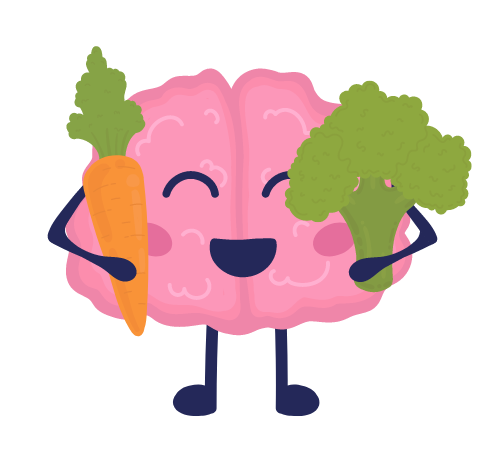
Much like a car, the brain requires the proper fuel to function. A well-balanced diet provides the brain with essential energy, which promotes mental clarity and focus. Key nutrients that support brain health include:
- Role: Essential fats (DHA, ALA, and EPA) that support brain health
- Health impact: Enhances cognition, lowers cardiovascular risk, and improves blood flow in the brain
- Food sources: Fatty fish (like salmon) and nuts and seeds (like flaxseeds and walnuts)
- Role: Essential nutrients that support various brain functions
- Health impact: Increases energy and metabolism and supports immune and nervous system function, as well as hormone regulation
- Food sources: Leafy greens, nuts, and whole grains
- Role: Essential compounds that protect the body and brain from oxidative stress
- Health impact: Improves learning and memory and prevents cognitive decline
- Food sources: Sweet potatoes, carrots, milk, leafy greens, nuts and seeds, whole grains, lean meats, tea, berries, apples, and dark chocolate
By choosing nutritious foods, you can adequately nourish your brain and improve your mental health.
The Role of Nutrition in Hormone Health
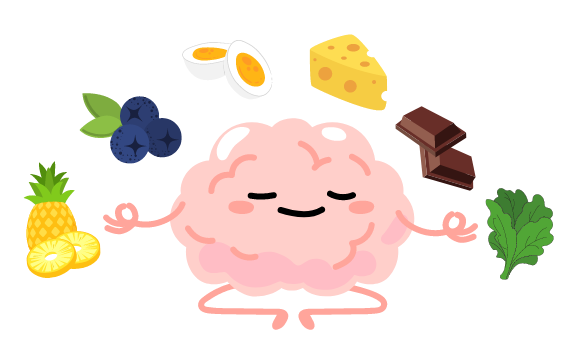
Hormones play a vital role in regulating mood, energy levels, and overall health. Some key hormones and their food sources include:
Serotonin
- Role: Also known as the “feel-good” hormone, serotonin is a neurotransmitter that regulates mood, appetite, memory, and sleep. It also promotes gut health and digestion.
- Symptoms of imbalance:
- Mental health: Depression, anxiety, suicidal thoughts
- Physical health: Disrupted sleep, fatigue
- Food sources: Turkey, eggs, cheese, nuts and seeds, tuna, and pineapple
Dopamine
- Role: Another “feel-good” hormone, dopamine regulates the brain’s reward system and enhances mood, motivation, and mental clarity
- Symptoms of imbalance:
- Mental health: Depression, lack of motivation, difficulty concentrating
- Physical health: Muscle cramps, aches, and pains
- Food sources: Lean meats, fish, dairy, nuts and seeds, bananas
Cortisol
- Role: Known as the “stress hormone”, cortisol is responsible for regulating the body’s stress response, metabolism, and immune function.
- Symptoms of imbalance:
- Mental Health: Excessive worry, anxiety
- Physical Health: Heart racing, excessive sweating, stomach fluttering
- Food sources: Dark chocolate, fruits, black or green tea, whole grains, legumes, leafy greens
By including foods in our diet that support hormonal health, we can nurture a healthy mind and body.
Diet and the Gut-Brain Connection
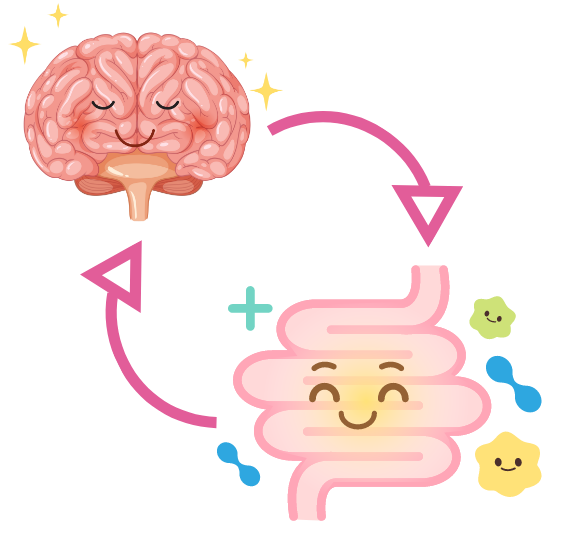
Diet significantly impacts bacteria in the gut, which impacts brain health, and vice versa. This communication between the gut and the brain is known as the gut-brain axis. Additionally, the gut produces about 95% of the body’s serotonin, which demonstrates the link between gut health and mental health. An imbalance in gut bacteria can lead to issues like depression, anxiety, addiction, schizophrenia, and ADHD, as well as neurological disorders, like Alzeheimer’s and autism.
Two essential components for a balanced gut microbiome include:
Probiotics
- Role: Healthy bacteria in the gut that support digestion and immune system function
- Symptoms of deficiencies:
- Mental health: Mood swings, anxiety, depression
- Physical health: Digestive issues, weakened immune system
- Food sources: Yogurt, kefir, sauerkraut, and kimchi
Fiber
- Role: Supports digestive health, regulates bowel movements, and helps control appetite and blood sugar levels
- Symptoms of deficiencies:
- Mental health: Irritability and mood swings
- Physical health: Digestive discomfort and constipation
- Food sources: Fruits (e.g., apples and pears), vegetables (e.g., broccoli and carrots), and whole grains (e.g., oats and barley).
By incorporating probiotic-rich foods and adequate fiber into your diet, you can improve your gut health, immune function, and emotional well-being.
Nutrition and the Body’s Systems
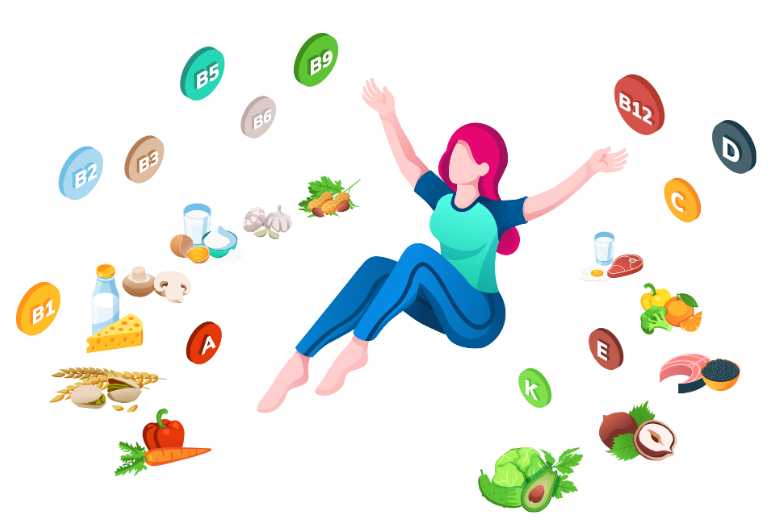
Proper nutrition is essential for supporting the body’s various organ systems. Below are some examples of how nutrients affect different systems:
Cardiovascular System
- Role of nutrients: Supports heart health, improves blood flow, reduces cholesterol
- Key nutrients:
Respiratory System
- Role of nutrients: Supports lung function, reduces inflammation, improves breathing
- Key nutrients:
- Vitamins A, C, D, and E: Carrots, citrus fruits, dairy, nuts and seeds
- Minerals (magnesium, selenium, zinc): Leafy greens, nuts and seeds, fish, whole grains
- Flavonoids: Berries, citrus fruits, tea
- Fatty acids: Fish, nuts and seeds
Musculoskeletal System
- Role of nutrients: Strengthens bones and muscles, aids in recovery and repair
- Key Nutrients:
- Calcium and vitamin D: Dairy products, leafy greens, fortified foods
- Protein: Lean meats, eggs, fish, beans, legumes
- Magnesium: Nuts and seeds, whole grains, leafy greens
- Vitamin K: Kale, spinach, broccoli
Immune System
- Role of nutrients: Boosts immune defense, protects against infections
- Key nutrients:
- Vitamins A, C, and D: Citrus fruits, bell peppers, strawberries, dairy, carrots
- Zinc, copper, iron: Meat, shellfish, legumes, nuts and seeds
- Selenium: Brazil nuts, fish, eggs, whole grains
- Probiotics: See above
Endocrine System
- Role of nutrients: Regulates hormone levels, supports metabolic processes
- Key nutrients:
- Iodine: Iodized salt, seafood, dairy
- B-Vitamins: Whole grains, meats, dairy, legumes, nuts
- Vitamin D: Dairy, fatty fish
- Chromium: Broccoli, grapes, potatoes, garlic
By consuming a balanced diet rich in essential nutrients, we can enhance our physical health, support our mental well-being, and reduce the risk of chronic diseases. Prioritizing a nutrient-dense diet helps each organ system function optimally, contributing to overall wellness.
Food for Fitness: Fueling Workouts with Proper Nutrition
Athletes and those who lead active lifestyles have higher energy needs than sedentary individuals. To meet these demands, they need adequate macronutrients (proteins, fats, and carbs) and micronutrients (vitamins and minerals). These nutrients are essential for fueling workouts, promoting muscle growth, and supporting digestion. Intake guidelines vary based on activity level, fitness goals, types of exercises, and other factors.
Macronutrients for Fitness
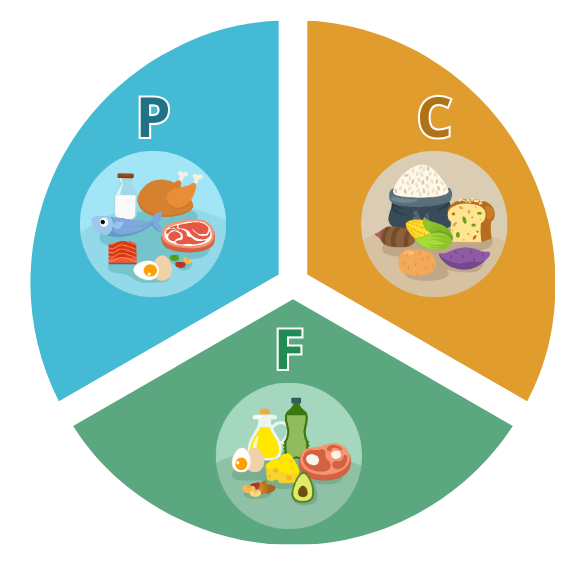
Here is a general overview of the three macronutrients and their food sources:
Proteins
- Role in fitness: Supports muscle growth and aids in recovery
- Guidelines: A good rule of thumb for physically active individuals is around 1 gram of protein per pound of body weight (about 15%-30% of daily calories)
- Food sources: Lean meats, fish, dairy products, eggs
Carbs
- Role in fitness: Fuels workouts, boosts energy, and supports recovery
- Guidelines: In general, athletes will need to consume approximately 1.4 to 2.3 grams of carbohydrates per pound of body weight daily for light activity and about 3.6 to 5.5 grams per pound of body weight per day for intense training (source).
- Food sources: Healthy carbs, such as whole grains, fruits, vegetables, and legumes
Fats
- Role in fitness: Provides energy, supports cell growth, and protects organs
- Guidelines: Between 20% to 35% of total calories daily
- Food sources: Unsaturated fats and fatty acids, like salmon, nuts, and avocado
The timing of macronutrients also varies based on type of exercise, exercise intensity, and other factors. This table gives an overview of macronutrient timing.
Micronutrients for Fitness
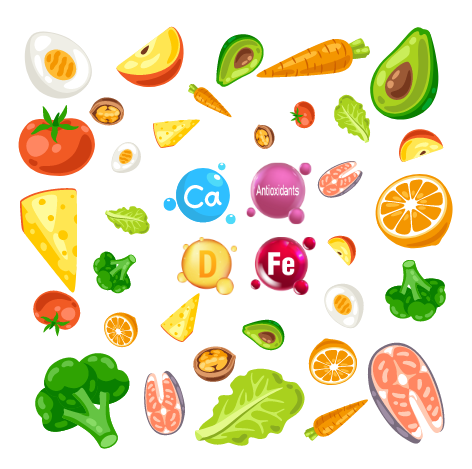
Here is a general overview of key micronutrients and their food sources:
Iron
- Role in fitness: Supports oxygen transport to muscles, prevents fatigue
- Food sources: Meat, seafood, eggs, vegetables
Vitamin D and Calcium
- Role in fitness: Strengthens bones, supports muscle function and repair, prevents injuries, reduces inflammation
- Food sources: Fatty fish, dairy, eggs
Vitamins (A, B, C, E, K)
- Role in fitness: Protects against oxidative stress, prevents fatigue, aids in muscle recovery, supports metabolism, protects against injury
- Food sources: Citrus fruits, vegetables, berries, tomatoes, seeds and nuts, kale, spinach, dairy products, meat, eggs, whole grains
Magnesium
- Role in fitness: Supports muscle function and metabolism
- Food sources: Leafy greens, whole grains, beans
For a more detailed list on micronutrients that enhance exercise performance, with daily recommended intake (DRI) guidelines, refer to this table.
To support fitness goals and long-term progress, athletes need a diet that includes balanced macronutrients and micronutrients, as well as proper hydration. Maintaining a healthy diet during rest and recovery is equally as important, so the body has the proper fuel it needs to support muscle repair, bone health, and injury prevention.
Fitness: Strengthening the Mind and Body
When we think of fitness, we often think of the physical effects and aesthetics, such as being lean, thin, or muscular. However, fitness is a vital tool for strengthening both the mind and body. According to the Physical Activity Guidelines, adults should engage in a minimum of 150 minutes of moderate-to-intense activity each week. Regular physical activity has significant benefits on overall well-being.
Types of Exercises & Their Benefits
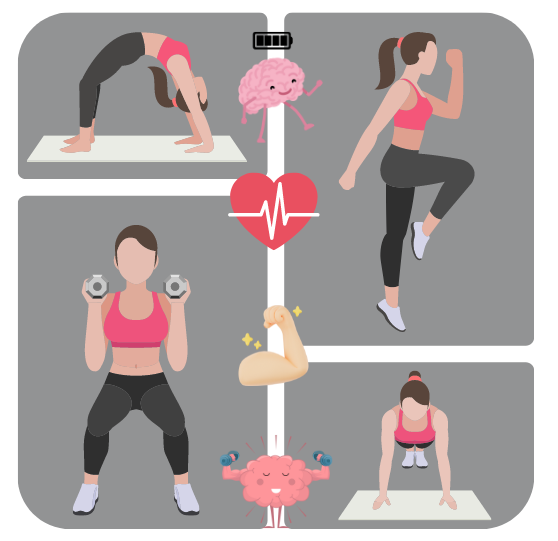
Different types of exercises provide unique benefits for both the mind and body.
Cardio
- Exercise type: Activities that increase heart rate, such as running, swimming, or cycling
- Health benefits:
- Mental health: Reduces symptoms of anxiety and depression
- Physical health: Improves cardiovascular fitness and lung capacity, reduces the risk of chronic diseases
Yoga
- Exercise type: A mind-body workout that focuses on breathing, mindfulness, flexibility, and balance
- Health benefits:
- Mental health: Improves relaxation, mindfulness, and mental focus
- Physical health: May improve strength and cardiovascular fitness, reduces chronic pain
Strength Training
- Exercise type: A form of exercise that uses resistance, weight, or force to increase muscular strength and endurance
- Health Benefits:
- Mental health: Reduces symptoms of anxiety and depression, improves body image and self-esteem, boosts mood, supports overall brain health
- Physical health: Increases muscle mass and strength, improves heart health and metabolism, lowers risk of injury, strengthens bones
Incorporating a variety of exercises into your routine can enhance both your mental and physical health.
Fitness and the Brain
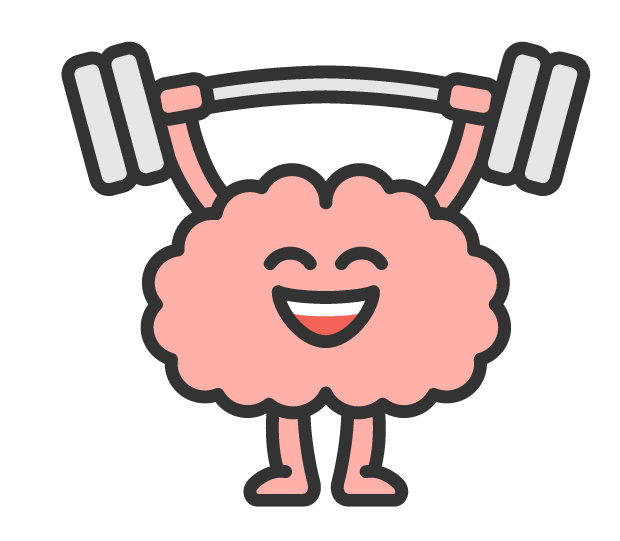
Exercise profoundly impacts brain health. The relationship between exercise and mental health starts with the hypothalamus-pituitary-adrenal (HPA) axis, which serves as the body’s command center. It not only regulates the body’s stress levels but also directly or indirectly influences numerous neurotransmitters in the brain and hormones throughout the body.
Chronic stress can deregulate the HPA axis, which can alter the brain’s reward system, affect learning and memory, and contribute to mental health issues, like depression, anxiety, and addictions. Additionally, chronic stress can have a negative impact on the blood-brain barrier (BBB), which acts as a shield to protect the brain from toxins. When the BBB is disrupted, it can make you more susceptible to neurological disorders.
The Role of Exercise in Hormone Health
Exercise helps balance hormones that regulate mood, stress, appetite, and overall well-being. Some of the hormones it influences include:
Endorphins
- Role: Hormones produced in response to pain or stress
- Effect of exercise: Triggers the release of endorphins
- Health impact: Reduces the symptoms of anxiety and depression, improves overall mood
Cortisol and Adrenaline
- Role: Hormones involved in the body’s stress response
- Effect of exercise: Lowers cortisol and adrenaline levels
- Health impact: Reduces anxiety, decreases stress levels, and improves mood
Dopamine and Serotonin
- Role: Neurotransmitters that regulate mood and motivation
- Effect of exercise: Increases dopamine and serotonin levels
- Health impact: Decreases stress and depression, enhances feelings of pleasure and reward
Reproductive Hormones
- Role: Hormones, like estrogen and testosterone, that regulate reproductive functions
- Effect of exercise: Helps balance hormone levels
- Health impact: Increases energy levels, supports reproductive health
Incorporating a variety of exercises that support hormone health can lead to improved mental clarity, reduced stress, and enhanced mood. By prioritizing physical activity, you can achieve better hormonal balance and overall well-being.
Exercise and Gut Health
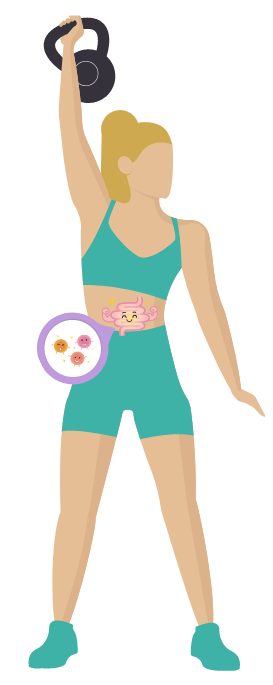
Research from the National Center for Biotechnology Information (NCBI) examined the relationship between exercise and gut health. Key findings include:
- Overall impact: Regular exercise is linked to better gut health.
- Combination in exercise types: An exercise program that incorporates both cardio and strength training has a greater impact on the gut microbiota than cardio alone.
- Exercise intensity: Moderate-to-high intensity exercises affect good gut bacteria the most.
- Frequency and duration: Engaging in exercise at least four times a week, particularly with sessions lasting 90 minutes or more, has the most positive impact on microbial diversity.
Regular exercise promotes a healthy gut, which supports digestion, immune function, metabolism, and overall well-being.
Fitness and the Organ Systems
Fitness benefits the body’s various organ systems. In addition to the positive effects on the brain (central nervous system) and the gut (digestive system) noted above, regular exercise promotes the health and function of several other vital systems.
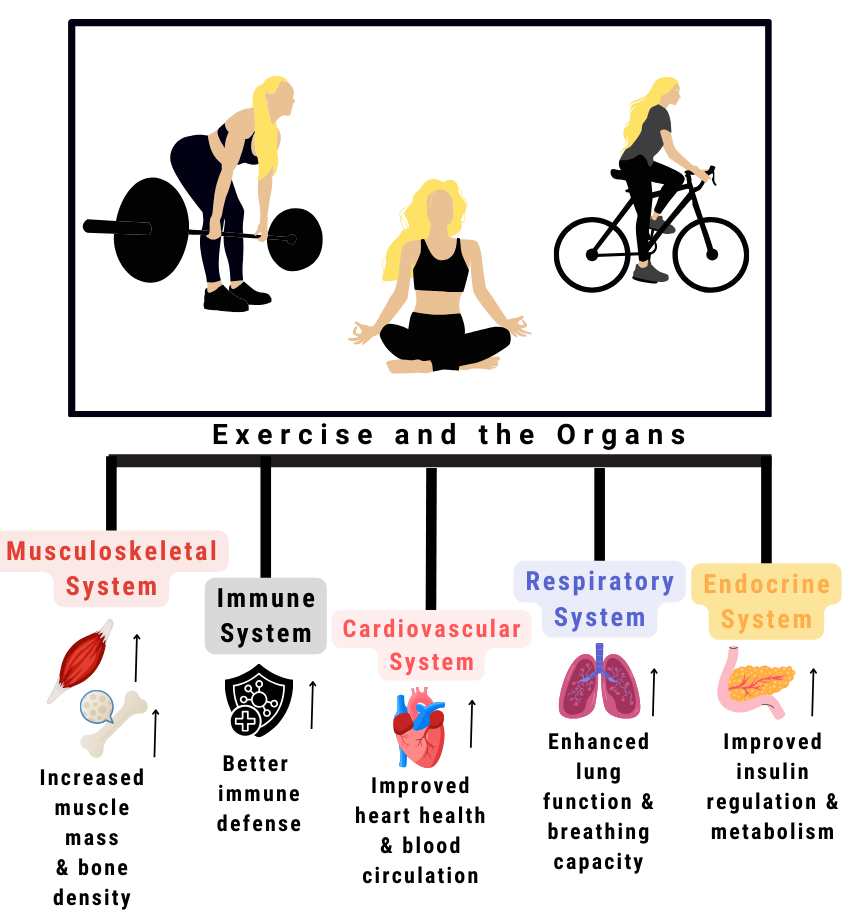
Musculoskeletal System
- Role of exercise: Strength training increases muscle mass and bone density.
- Health impact: More muscle mass and stronger bones helps protect against falls and injuries.
Cardiovascular System
- Role of exercise: Cardio improves blood flow to the heart.
- Health impact: Better blood circulation can lower bad cholesterol, increase good cholesterol, and decrease the risk of cardiovascular diseases.
Respiratory System
- Role of exercise: Cardio improves lung function.
- Health impact: Healthier lungs help you breathe better and ease respiratory conditions, such as asthma.
Immune system
- Role of exercise: Moderate-to-intense exercise improves the body’s immune response.
- Health impact: A healthy immune system helps the body fight infections and lowers chronic inflammation, which is linked to many diseases.
Endocrine System
- Role of exercise: Regular exercise plays a crucial role in regulating hormones within the endocrine system, like insulin.
- Health impact: Better insulin regulation aids in blood sugar control and supports a healthy metabolism, which reduces the risk of endocrine disorders, such as type 2 diabetes.
By engaging in a variety of exercises that benefit each organ system, we can promote overall health, reduce the risk of chronic diseases, and enhance our quality of life. Regular physical activity is essential for maintaining a healthy mind and body.
Daily Habits for a Healthy Lifestyle
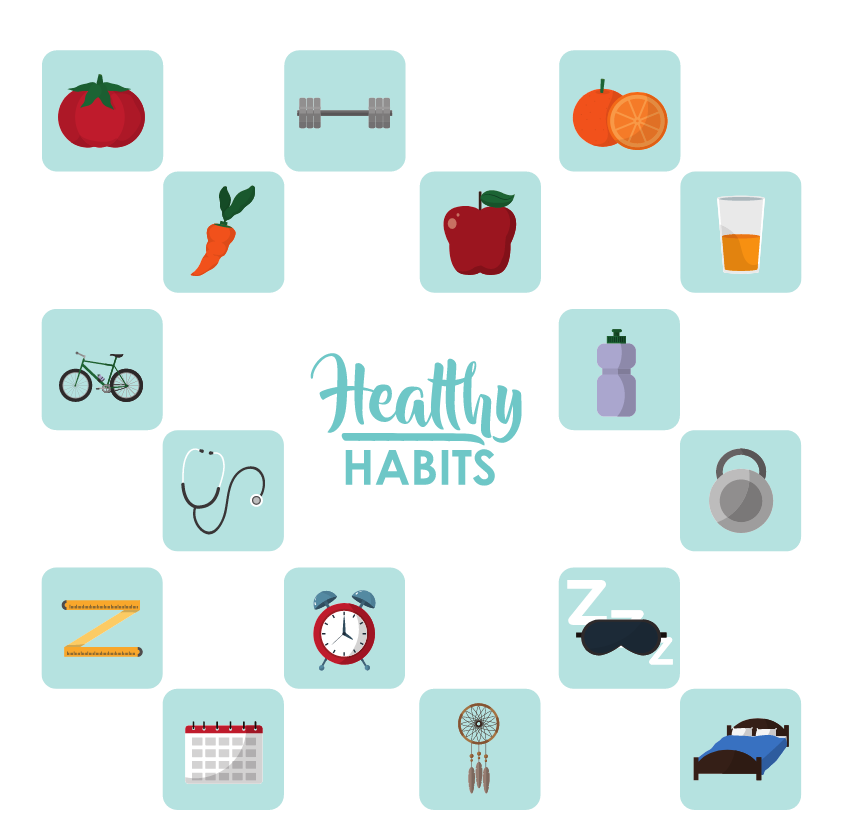
Building healthy habits is key to maintaining a balanced lifestyle that promotes both physical and mental well-being. Here are some practical tips to incorporate into your daily routine:
- Consume a balanced diet : Include a variety of foods in your diet, including fruits, vegetables, whole grains, lean proteins, and healthy fats, to fuel your body with essential nutrients for overall health and well-being.
- Stay hydrated: Drink at least 6 to 8 cups of water daily to support hydration, digestion, and muscle function.
- Eat mindfully: Practice mindful eating by slowing down, paying attention to your food, and listening to your body’s hunger and fullness cues.
- Create a routine: Plan and schedule your workouts in advance to establish consistency and make exercise a regular part of your daily life.
- Mix it up: Incorporate a variety of exercise types, including cardio, strength training, and flexibility exercises, to engage different muscle groups and keep your workouts interesting.
- Prioritize rest and recovery: Allow your body sufficient time to rest and recover between workouts to prevent fatigue, reduce the risk of injury, and optimize performance.
- Get enough sleep: Aim for 7 to 9 hours of quality sleep each night to support muscle recovery, weight management, and overall health.
- Manage stress: Prioritize relaxation and self-care to manage your stress levels and improve mental well-being. For more information on how stress affects your health and tips on coping strategies, check out my previous post on stress.
By integrating these practices into your daily life, you can cultivate a lifestyle that nurtures both your mind and body.
The Power of Food and Fitness for Mind & Body
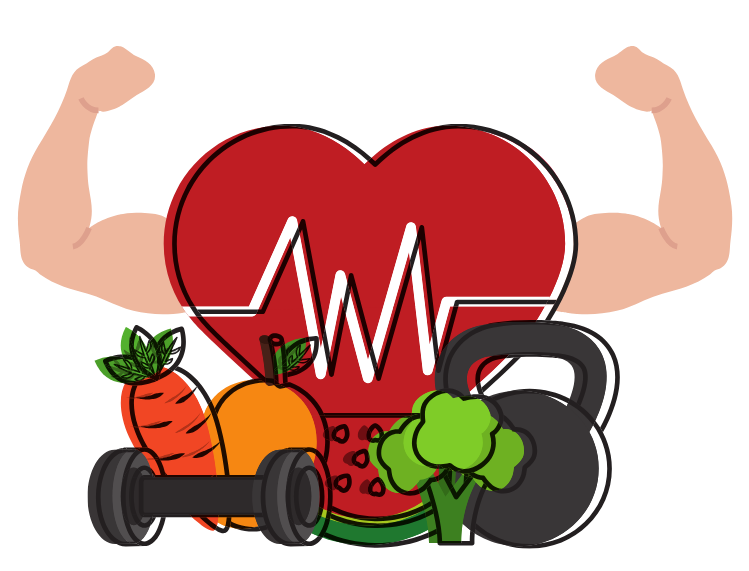
Food and fitness are powerful tools for both physical vitality and mental resilience. By making mindful choices about what we eat and how we move, we can create a more vibrant and fulfilling life.
Start where you are, set achievable goals, and build upon your progress. Most importantly, find balance and stay consistent. Every small step towards healthy nutrition and regular exercise paves the path to overall well-being.
Embracing a healthier lifestyle goes beyond the physical; it’s a commitment to personal growth and strengthening both the mind and body. Let the power of nutrition and fitness guide you on the journey to better health.
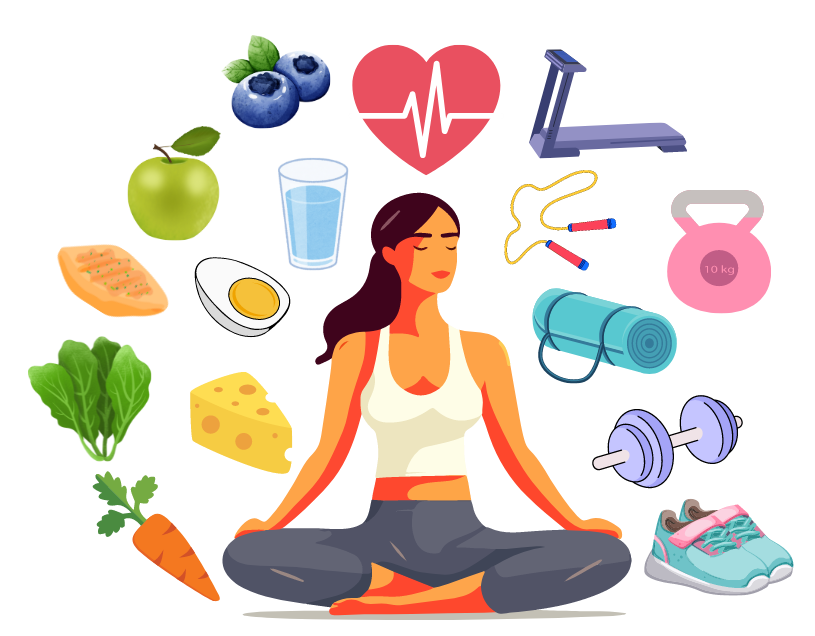


Pingback: Building Healthy Habits for a Better You - Breanna Williams
Pingback: Personality Paralysis: The Perils of Perfectionism - Breanna Williams